
I wanted to get my stories out there as a writer and have always loved films. In my younger days, I would watch the same movies over and over, reciting lines, renting as many videos as I could from the local video stores, and just absorb myself in the stories. I thought the best way to get to direct that was to get some training to be a part of this dream I had as a child of being in “film”.
Also, I did not have the financial resources to buy a camera, equipment, and shoot. I thought getting a student loan and studying would allow me easy access to equipment, knowledge, and resources, which it did. My screen production degree enabled me to direct my first two shorts, make mistakes in a quiet way, learn, and go from there.
Granted I have a huge student loan now, but it was worth it. I was told I was an actor’s director because I think maybe my protectiveness and understanding of their process come across when I am on set. However, I adore the power of the combined creative elements that go into telling a story well; the image is as important to me as the actor’s performance, but I have more experience with the latter.
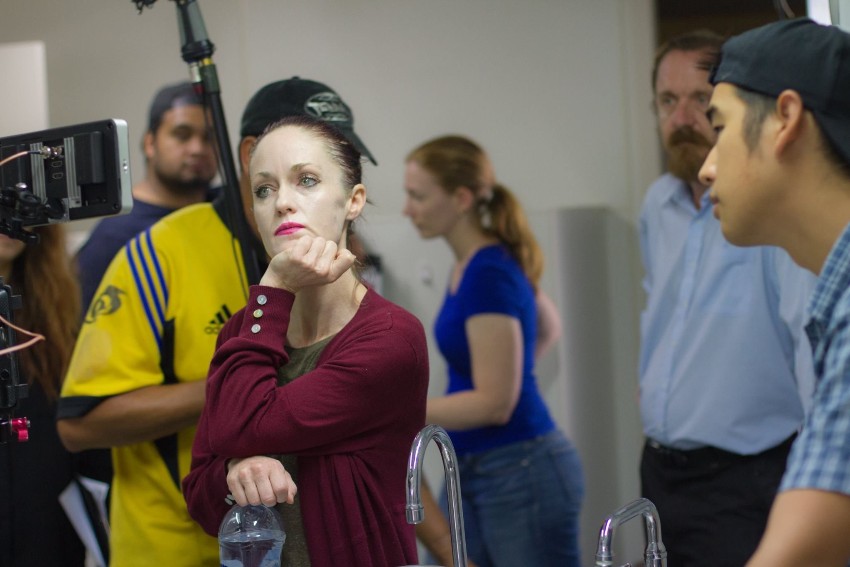
indieactivity: Do you hire a casting director, or do you like to choose the cast yourself? If so, what criteria go into your casting?
Kirsty Hamilton (KH): I haven’t hired a casting director so far. As an emerging director, I’ve had to keep costs down plus having been an actor for thirty years it makes sense to use those skills and to cut out the middle woman/man until I am dealing with more funding and investment in my projects.
I have strong and immediate feelings about who I want to cast so sometimes I audition and at other times don’t and that’s usually when I cast young actors that I hold open auditions. I almost always know who I want for a role, so I don’t put that through that nerve-wracking heartbreaking audition process.
Having said this, as I build my career I will at times go to a casting director and work with them, great ones are a huge boon to any project, but I do like to be in the room rather than watch a tape.
What went into the casting process for “SAVE ME”?
Kirsty Hamilton (KH): We are still fundraising on our Kickstarter page for the next three weeks until July 20th, 2022. We will also apply for New Zealand Film Commission funding with the goal of making our designated budget, but you never know if you’ll be successful with government film funding or not, it’s tough.
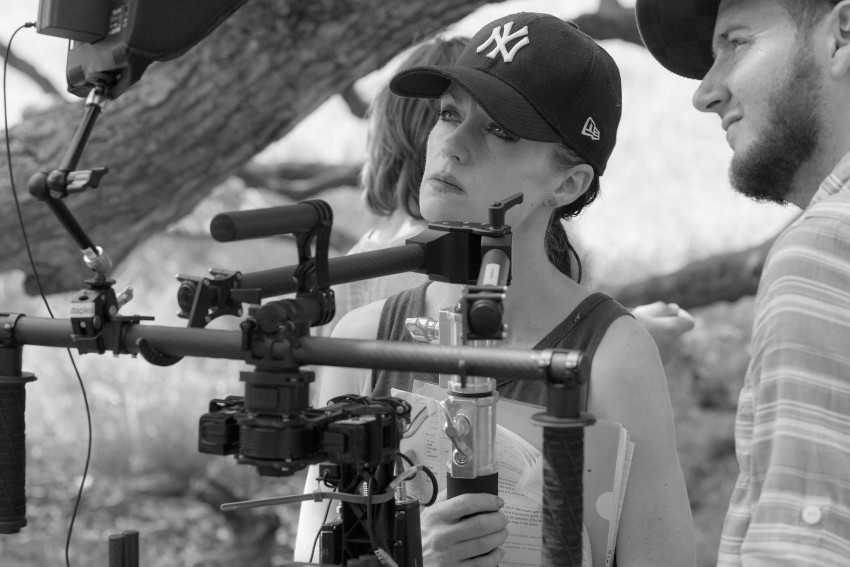
With this film, I will hold auditions because for the first time ever I don’t know exactly who these two amazing female roles might be right for. I want to spread the net as wide as possible as the emotional range in this film for the women is huge, but the female talent in New Zealand is incredible so I will be spoilt for choice.
Without giving anything away, tell us a little bit about the script, how did you come up with the idea?
Kirsty Hamilton (KH): This time around I am directing and didn’t write the script which has been a fascinating, important process for my development as a director as well as in interpreting someone else’s work and collaborating on it.
Suzanne Adamson wrote this script. She’s incredibly talented. I have had a little experience myself with writing, with an MA in script writing and having written my last three shorts, with a feature in development too. It’s been utterly rewarding coming to understand why Suzanne wrote Save Me and how her creative brain works.
I won’t speak to what prompted Suzanne to write, that’s her story to tell. But I will say she has the gift of being able to transport the deeply personal, and place it in an imaginative world that is full of hope and fear, the hope that the protagonist gets what she needs, the fear she won’t, ultimately making her scripts very universal
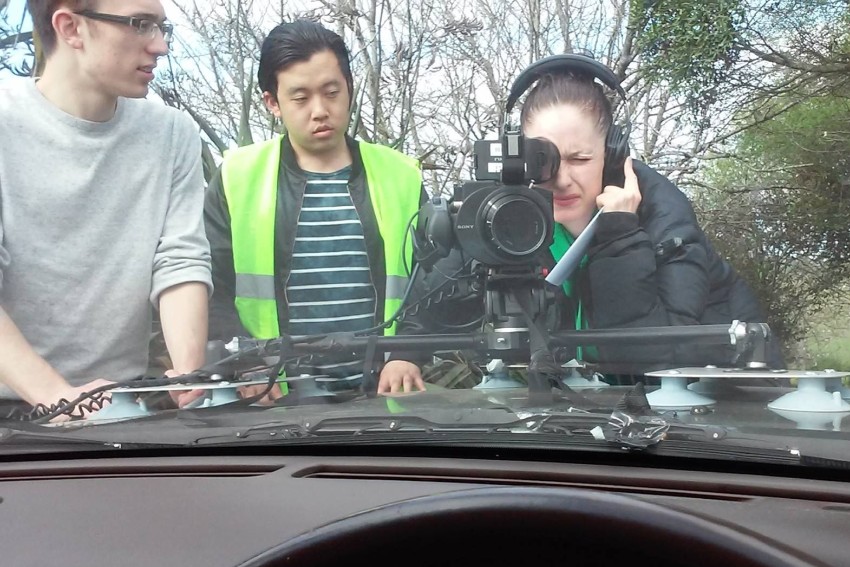
Who is “SAVE ME” for? Who do you think would enjoy it the most?
Kirsty Hamilton (KH): I think it’s for mothers and daughters, for anyone who has struggled with mental health issues relating to significant losses in their lives, and for any child who has seen a parent suffer emotionally and mentally and wanted badly for them to be well again. I also think it’s for those who have sacrificed their identity to make someone else feel better and suffered for that sacrifice.
How long will it take to shoot the entire film?
Kirsty Hamilton (KH): We have budgeted and are planning for a rehearsal day in the two location spaces, and a five-day shoot. For a short film in general and particularly in this current financial climate it makes things challenging in terms of budget. But with a successful Kickstarter which we are working hard to meet by July 20th, 2022, and extra work to meet the projected budget, we really believe anything is possible.
All it takes is hard work and reaching out as much as is humanly possible. The logistics we have involve shooting on a boat, two actors in water, a bonfire, and SPFX. All we needed to make it insurmountable would have been animals and babies! We are bloody lucky with all the phenomenally experienced film practitioners, crew, and cast in New Zealand that we have been and will be consulting to be true to the heart of this film.
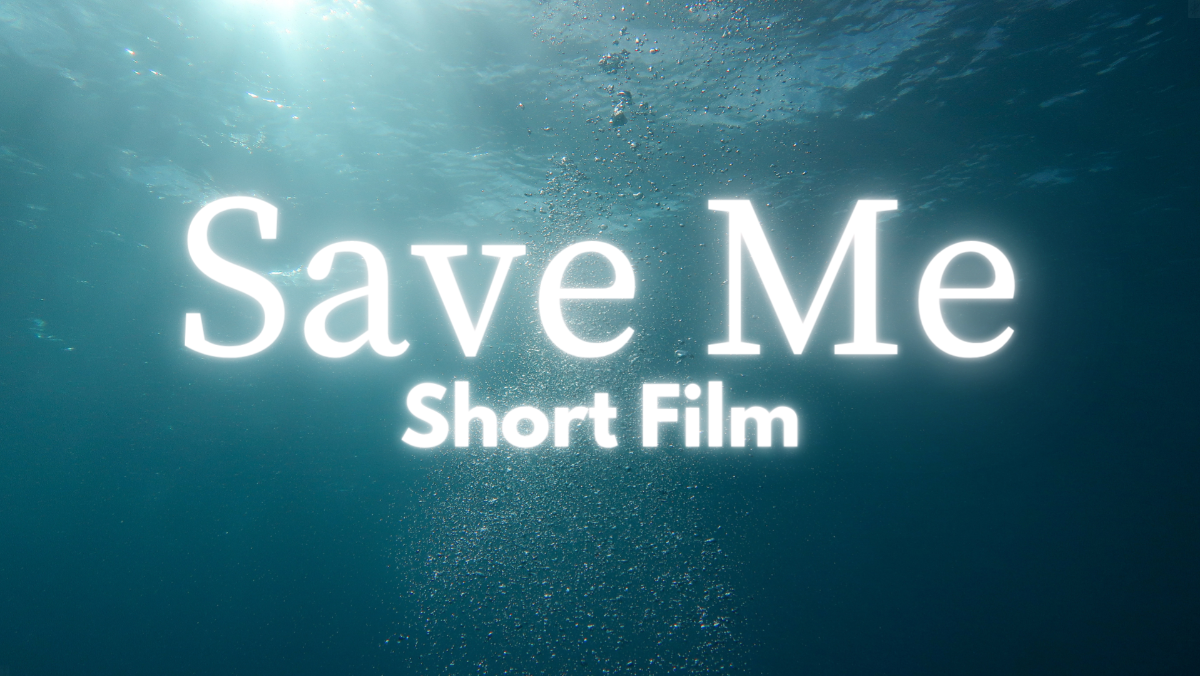
It’s also vital for me that we have a 5-day shoot not only because of those logistics, but because the actors have to produce such a wide-ranging set of emotions.
How long was the post-production process?
KH: We are yet to get to this but will work hard to raise the funds we need to try to keep this short and sweet. We are lucky that before we have even shot that Conan Mornard- Stott has come on board as editor and sound designer – he’s not only a talented editor but easy to work with and has excellent instincts for putting together a story that moves audiences emotionally.
The film had a lot of talent working behind the scenes as DPs, sound designers, composers, etc. Why is diversity important both in front of and behind the camera?
KH: For me, empowering diverse talent including women practitioners both behind and in front of the camera is vital, it is a huge part of what drives me to make films. It shouldn’t just be one group of people with financial resources telling stories on screen.
I also know you can’t tell someone else’s story without having gone through what they have. But you can be an ally or a facilitator for others to tell their stories. Films that move come from all peoples from all parts of the world. We can’t find empathy, we can’t ever create equality if we don’t hear and see, how others experience the world, how others view it, and why.
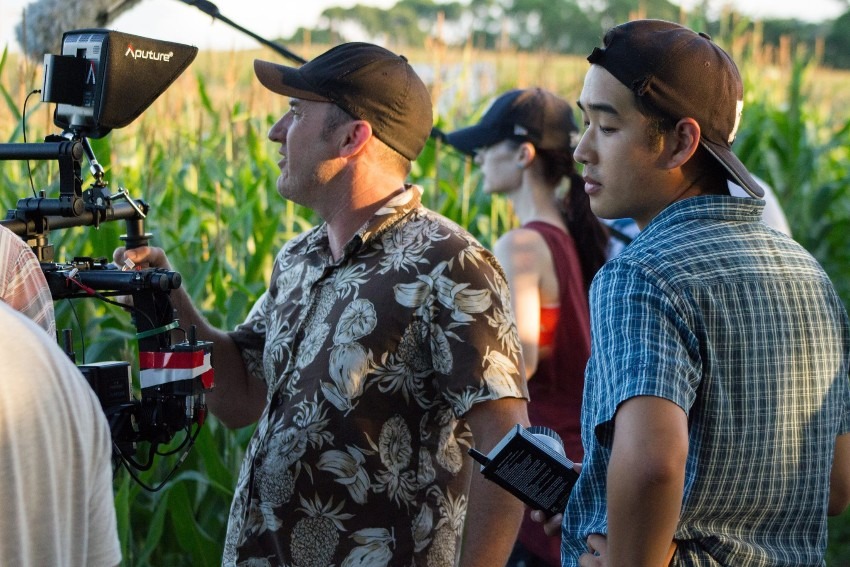
I have had trouble breaking through myself to establish a career in film and television and I don’t want that for others. I also know I have been afforded opportunities in front of the camera in bits and pieces in my very early years after drama school as an actress that brought me incredible creative joy that others did not get, it slowed right down for me when I left NZ for overseas and then returned, but the passion, knowledge and deep love for the craft has always been very deeply felt for me and will never leave.
This has made me want women and older practitioners to be supported, employed, funded, given jobs on sets acting, crewing, directing, and given a first or second chance to contribute their experience and skills.
Most people don’t start their life out with a camera in their hand, or doors opening for them, some people mother, build roads, nanny, housekeep, wait tables, clean toilets, and are in smaller less wealthy, corrupt countries with few or no resources where survival is paramount not making films. Just to get to a point of being able to tell your story for a lot of people, after trauma, a system that doesn’t support or value them, well it can take an age.
So, we should create more programs, and invest in filmmakers, female, and old, of all backgrounds, cultures, and differently-abled, hues. Everyone has a story to tell, they just need some good people on their side, mentors, facilitators, and champions. Funders and investors need to trust older people, women, and people of all colors and cultures; employ us, trust us to lead behind and in front of the camera, and the investment will be worthwhile.
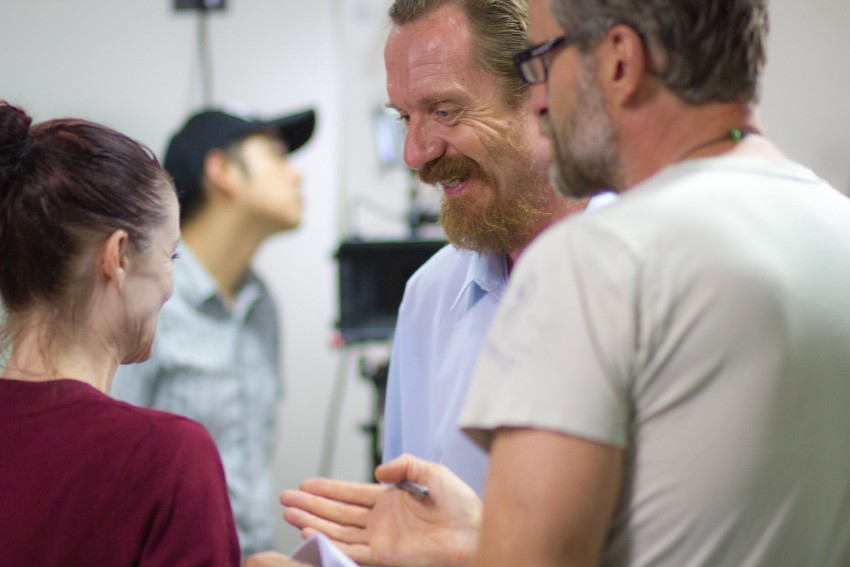
What are your goals with “SAVE ME”?
KH: To have it move people emotionally, connect, and reach wider audiences than previous films.
What’s next for you? What are you working on right now?
KH: Right now, getting the funds to make a budget for Save Me via Kickstarter until July 20th and other funding applications. Finishing up my pre-vis, casting, and other shoot prep. After this film, I have two other shorts I need to script as well as my feature rewrites. I will also be collaborating again with Suzanne (the writer of Save Me) on other projects and, if lucky enough, also with our incredible producer Lynnaire MacDonald and very talented and experienced DOP Jess Charlton on my feature.
What would you recommend to a new director at the beginning of his/ her journey? Any special courses, workshops, or helpful books they can read?
KH: There are so very many great screenwriting books out there. The same core group of gurus comes up because their advice works. There are fantastic online resources (I like Studio Binder and Film Courage, listening to film festival talks from directors and writers). Directing you learn your biggest lessons on the set, making mistakes, making good decisions too, being in the thick of it, collaborating.
My biggest piece of advice for short films is: to prepare immaculately, image folders, storyboards, prioritized shot lists, coverage scripts, etc. Share that info with all key crew, and talk it out. Develop a strong relationship with your DOP. Have a rehearsal day on location – a quiet walk-through with the core cast with the tough emotional scenes with difficult logistics, and with the camera.
\Actors don’t have to act their hearts out at all, just talk it through, see the space, and work with props. It’s important also for the key crew to look, consider where the camera will go, and look at lighting – your shoot days will go smoother on a short film if you get that one day in addition to an earlier read-through and discussion with actors about characters motivations and the units/beats. I know not all actors want this/work this way. But so far, for the films I did this for, shoot days ran smooth.
TV does not allow for much of this, but it can be squeezed in at times and helps. Best prep allows for you to be more flexible, and collaboratively come shoot days. I’ll make time and budget for a rehearsal for my features if we can, it’s so very valuable. One of my favorite short films did a practice shoot of the whole film, shot it, and learned from it prior to the actual shoot. That’s not possible for most films money-wise, and time-wise, but it paid off, it’s such an excellent film; Luke Doolan’s Miracle Fish (2009).
Who is your favorite director? Why?
KH: A few that come to mind (I can’t name only one – sorry!) … Ken Loach because he is a voice for people that struggle in unfair, unjust systems, for those that work hard in domestic, manual labor, low paid jobs, the unemployed, those affected by trauma and abuse, the ignored and uncared for. He speaks with raw truth, without frills, doesn’t dress things up, shows the system for what it is, and is a master storyteller. Ken never makes life easy for his characters, the obstacles for his protagonists are real, relatable, and huge.
Loach always escalates the tension for his characters and it’s excruciating to watch in the best way. You root for his characters to get a break, a way out, some respite, often it never arrives, and I love that. There is absolutely nothing wrong with a bitter, or tragic ending – Shakespeare did it why can’t we? I have heard funders sometimes say, “As long as there is hope in the darkness”. Hope isn’t always obvious. It can come in many forms in stories sometimes very subtly. Sometimes it’s in the lesson of a tragedy. In Romeo and Juliet, we learned warring between families leads to the tragic loss of young lives.
In Loach’s films, we learn governments and societies need to better care for all not just for the wealthy few. Hope is in a tiny moment of realization the protagonist has, or a feeling they experience at the very end of a film, that we witness. We, the audience see they feel what they have done is wrong for them, for others, they haven’t fully learned the lesson, but the audience feels they will beyond the story’s end.
Can I add Sidney Lumet, Lynne Ramsay, Ave Du Vernay, Jordon Peel, Steve McQueen, Reed Morano, Kimberley Peirce, and Barry Jenkins…It’s very difficult to choose. These filmmakers not only say important things about the human condition but illuminate and illustrate social issues creatively and viscerally.
What advice would you give directors around the world?
KH: Never ever give up on manifesting your films or TV projects, no matter how old you get. Know what effect you want to have on your audiences. When lack of finance is a roadblock, don’t accept it, reach out, swallow your pride, and don’t be afraid to ask for help; we can’t make films alone, it’s not physically, financially, or emotionally sustainable, and you burn out eventually especially if it’s around day jobs as it often is starting out.
Be prepared to work very hard. Don’t let the huge amount of rejection you will face in this industry break you, let it strengthen you. Keep a deep belief in yourself quiet but let it drive you. Put what you feel and know to be true into your work and don’t be afraid to say things that scare or make others feel uncomfortable even if it’s not popular.
Have read-throughs of your scripts, don’t wait too long for that. Actors’ and writers’ feedback and experience are gold. They will help you see how your work is being received. When your work is read out loud by professional actors you will wince when it doesn’t work and feel like crying when it works as it should.
You can rewrite and build from there. Keep striving, sending in funding apps, applying for attachments, and every opportunity you can to get that financial support you need to create space to do what you love – write and direct films and TV.
Tell us what you think of the interview with Kirsty Hamilton. What do you think of it? What ideas did you get? Do you have any suggestions? Or did it help you? Let’s have your comments below and/or on Facebook or Twitter.
Follow Kirsty Hamilton on Social Media
Website
IMDb
Facebook
Twitter
Instagram
Linkedin
Richard Green Documentary, ‘I Know Catherine, The Log Lady’: Premiere in NYC, LA May 9th
Lynchian Doc I Know Catherine, The Log Lady Makes Hollywood Premiere 4/17, Rollout to Follow
In Camera by Naqqash Khlalid Launch on VOD April 29
Naqqash Khlalid’s Directs Nabhan Rizwan. In Camera stars an EE BAFTA Rising Star Award Nominee.
2025 Philip K. Dick Sci-Fi Film Festival Award Winners Announced
Vanessa Ly’s Memories of the Future Awarded Best PKD Feature
Dreaming of You by Jack McCafferty Debuts VOD & DVD for April Release
Freestyle Acquires “Dreaming of You” for April 15th Release
Hello Stranger by Paul Raschid set for London Games Festival & BIFFF
The film Is set for an April 10th Premiere at The Genesis Cinema in London (LGF) and BIFFF
Daydreamers Official Trailer by Timothy Linh Bui: Released by Dark Star Pictures
Daydreamers Vietnamese Vampire Thriller – May 2nd release









